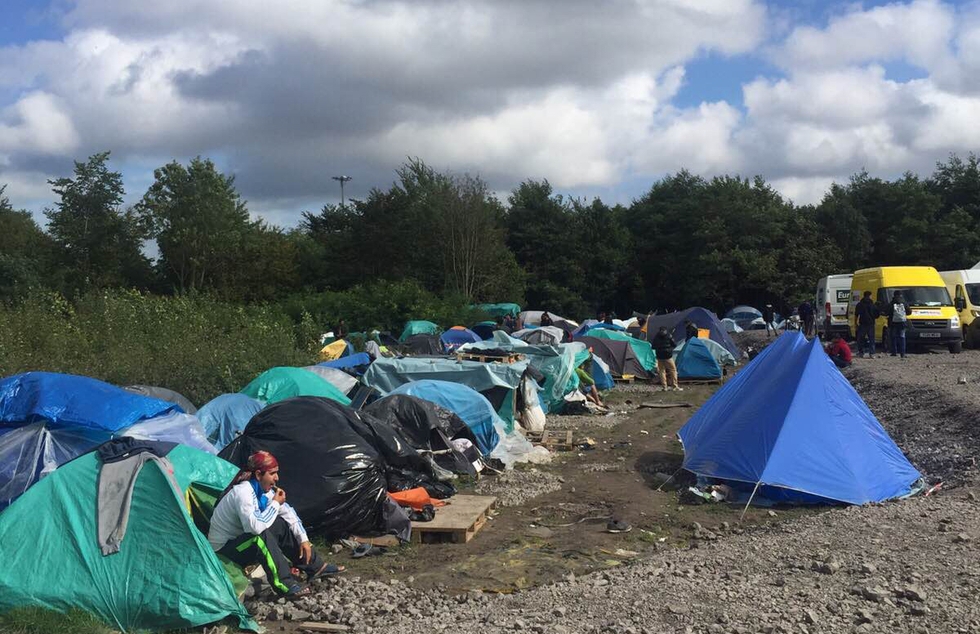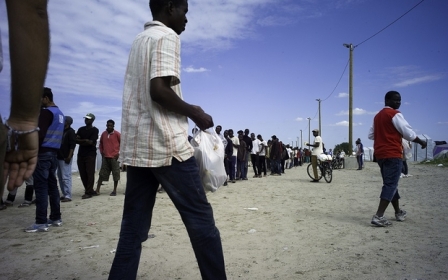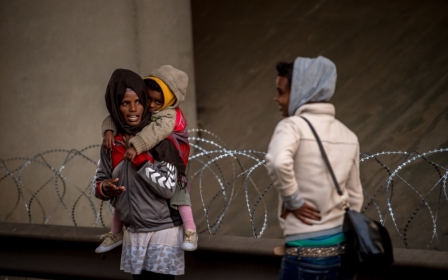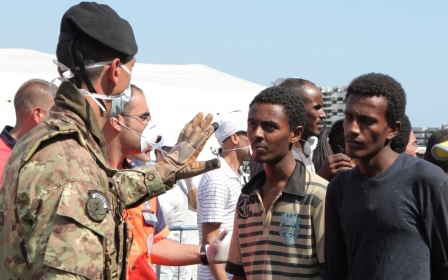The misery of Calais Jungle shows bankruptcy of Western moral values

Driving back from the infamous “Jungle” refugee camp in Calais a fortnight ago, I questioned whether European governments had a moral compass. What I saw with my very own eyes was something that would stay with me forever. Thousands of people residing in sub-human living conditions, and entire families squashed in makeshift tents made out of plastic bin bags and tree branches.
The current refugee quagmire has been dubbed as the biggest crisis Europe has faced since the Second World War. Hundreds of thousands are fleeing war-torn countries with hopes of seeking asylum in Europe - ideally in Germany or the UK.
In the Jungle, beyond the sharp smell of excrement and urine, I spoke to a number of Sudanese, Iraqis, Afghans, Syrians and Libyans who were merely looking for a better life. Many were business owners, middle-class and well-educated, whose fortune had taken a drastic turn due to the wars that have been waged, instigated or orchestrated by the countries they are now seeking refuge in. The huge humanitarian crisis that has been inflicted on North Africa, the Middle East and beyond has now arrived at Britain’s doorstep, but there is a wider political reality that is being conveniently brushed under the carpet.
It was only after the horrifying images of three-year-old Alyan Kurdi’s dead body washed up on the Mediterranean shore, when Prime Minister David Cameron’s conscience forcibly came alive. Prior to this, Cameron’s zero-tolerance attitude towards the “swarm” of refugees that included Syrians was made very loud and clear. Refusing to accept the European Union’s refugee quota, and only agreeing to accept the laughable sum of 800, Cameron quickly changed his figure to 20,000 in the face of public pressure. However, Cameron’s promise to accept more Syrian refugees is being taken with a pinch of salt, as he opted for a cheap PR trip to Lebanon to “assess the refugee crisis,” while thousands of Syrians are stranded between Calais and Budapest.
Cameron’s "initial" approach to the Syrian refugee crisis was not that different to most European governments, with the exception of Germany, who’s commendable “open-arms” policy is worthy of much praise. This attitude of disdain that has infected Europe in its handling of the refugee crisis is one that must be understood from a socioeconomic and political perspective.
The ‘migrant threat’ to Europe
Socially, the predominantly Muslim majority refugees are perceived as a “cultural threat” to Europe’s Christian identity. This bigoted perception has already been voiced by religious and political figures in Slovakia, Estonia, Poland, Bulgaria and Cyprus, as well as right-wing groups in Germany, France and Britain. Perhaps Europe should be reminded of the contribution that non-Caucasian “migrants” had in rebuilding its economy after two world wars. Also, historically, the Muslim Ottoman Caliphate welcomed Christians and Jews to live and trade freely in its empire during times of war and hardship.
Economically, there is the popular propaganda that the “migrants will take all the jobs” – even the jobs that do not exist, or that people simply refuse to do. In Britain, there is a growing fear, which is manipulated and capitalised on by the right-wing press and some politicians, that these “foreign parasites” will also scrounge off the welfare system. This empirically unsubstantiated misconception is being peddled by anti-immigrant parties who categorically ignore the benefits that an influx of “migrants” can have on recovering economies. The labour workforce is strengthened, skilled craftsmanship is diversified, and the overall net fiscal contribution made by "migrants" is higher than for native Britons.
It is understandable that European governments do not want to open a can of worms with a free movement border policy, which may pose socioeconomic and national security dilemmas in the future. However, Europe and Britain in particular should put hypothetical kneejerk scenarios aside for now, and reflect on its moral obligation to respond to the current refugee crisis.
Western wars create chaos
Prior to the Afghanistan and Iraq wars, there were no Iraqi and Afghan refugees trying to enter Europe in their thousands. Prior to the US-led war in Iraq, there was no ISIS. Prior to the NATO-led airstrikes, which subsequently helped remove Colonel Gaddafi, there was no mass movement of refugees from the shores of Libya.
On top of this, four years of empty rhetoric from European leaders against the regime of Bashar al-Assad, whilst hastening towards an international coalition to bomb ISIS, has only exacerbated the refugee crisis. Simultaneously, Assad has barrel bombed and gassed entire villages, under the silent gaze of Europe. But the emergence of the self-professed “Islamic State” called for an immediate and radical response from Europe - as if hundreds of thousands had not been slaughtered and displaced at the hands of Assad since 2011.
My simple message to European leaders, with the exception of Angela Merkel, and specifically to Mr Cameron and Francois Hollande, is that you reap what you sow. The human cost of Western wars, past and present, has come home to roost, and it must be dealt with compassionately, with a sense of guilt and realisation that constant interference in the affairs of sovereign nations for geopolitical and economic reasons has significantly contributed to the current refugee crisis.
The 50-van aid convoy I accompanied did not stop at Calais; a majority of the fleet went onto delivering aid to refugees in Germany, Austria and Hungary. The stories and accounts of the refugees were the same; most of them were Muslims escaping wars or countries destroyed by previous conflicts.
A few days after I left Calais, reports and videos emerged from the Jungle showing French police evacuating a Syrian camp and using tear-gas against the refugees. It is this kind of inconsiderate behaviour from the French and other European authorities that made me wonder: on what moral grounds do Western leaders preach to the rest of the world about their illustrious humanitarian values? None, methinks.
- Dilly Hussain is the deputy editor of British Muslim news site 5Pillars. He also writes for the Huffington Post, Al Jazeera English, and contributes to the Foreign Policy Journal and Ceasefire Magazine. He regularly appears on Islam Channel, Russia Today, and BBC TV and radio discussing Middle East and North African politics, British foreign policy, Islamophobia and the war on terror. Find him on Twitter @dillyhussain88
The views expressed in this article belong to the author and do not necessarily reflect the editorial policy of Middle East Eye.
Photo: Migrants wait in a migrant camp in Calais, northern France, September 2015 (Dilly Hussain)
Middle East Eye propose une couverture et une analyse indépendantes et incomparables du Moyen-Orient, de l’Afrique du Nord et d’autres régions du monde. Pour en savoir plus sur la reprise de ce contenu et les frais qui s’appliquent, veuillez remplir ce formulaire [en anglais]. Pour en savoir plus sur MEE, cliquez ici [en anglais].





